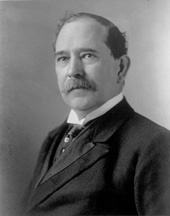George Turner (politician, 1850)
George Turner (born February 25, 1850 in Edina , Knox County , Missouri , † January 26, 1932 in Spokane , Washington ) was an American politician who represented the state of Washington in the US Senate .
After completing his schooling in Missouri, George Turner joined the Union Army at a young age during the Civil War , for which he worked in the telegraphic field until 1865. Afterwards, he studied law , was admitted to the bar in 1869 and began in Mobile ( Alabama to practice). From 1876 to 1880 he was US Marshal for the central and southern judicial districts of Alabama before serving as associate judge on the Supreme Court of the Washington Territory from 1885 to 1888 .
From 1888 Turner worked again as a freelance lawyer in Spokane, where he also worked in mining. In 1889 he took part in the Constitutional Convention of the Territory , in which the first constitution for the new state of Washington was formulated. In the same year he ran unsuccessfully as a Republican for a seat in the US Senate; In 1893 he failed again. He was not successful until 1897, this time running as a candidate for the Silver Republicans , a split from the Republican Party, and was supported by Democrats and populists . He remained in the Senate until March 3, 1903 and did not run again.
In 1903 Turner was an American delegate to a mediation commission to resolve a dispute over territorial claims with Canada ; In the following year he applied for the office of governor of Washington , meanwhile joined the Democrats, unsuccessfully . After serving as legal advisor in the fisheries dispute with Great Britain in 1910, he was appointed to the International Joint Commission by US President William Howard Taft , which was tasked with resolving disagreements between the United States and Canada over the use of the shared border waters. He sat on this commission from 1911 to 1914; then he was on this body again from 1918 to 1924 as the legal representative of the United States. He then returned to his office in Spokane, where he died in 1932.
Web links
- George Turner in the Biographical Directory of the United States Congress (English)
- George Turner in the database of Find a Grave (English)
| personal data | |
|---|---|
| SURNAME | Turner, George |
| BRIEF DESCRIPTION | American politician |
| DATE OF BIRTH | February 25, 1850 |
| PLACE OF BIRTH | Edina , Knox County , Missouri |
| DATE OF DEATH | January 26, 1932 |
| Place of death | Spokane , Washington |

